Introduction
Following the July 31, 2024 assassination of Hamas Political Bureau chief Ismail Haniyeh at a Tehran guest house belonging to Iran's Islamic Revolutionary Guards Corps (IRGC), the Iranian regime leadership, first and foremost Iranian Supreme Leader Ali Khamenei, vowed to take exceptionally harsh retaliatory action against Israel, "at the most unexpected time and place." Hours after Haniyeh's assassination was announced, Khamenei promised to avenge him, stating:
"The criminal and terrorist Zionist regime has turned our dear guest into a martyr in our home, thus causing us great sorrow. But it has also prepared the ground for a harsh punishment for it... As far as we are concerned, it is our obligation to avenge this painful and bitter event, that took place within the borders of the Islamic Republic."[1]
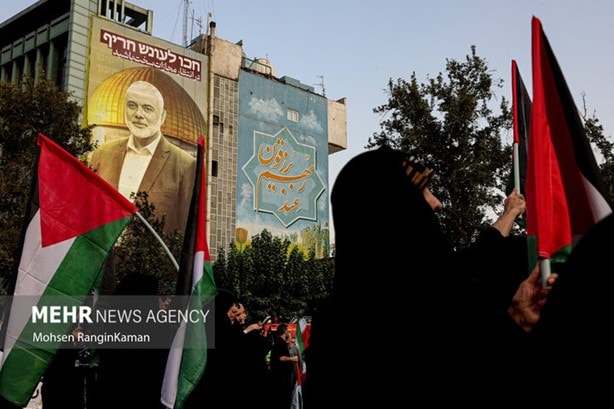
On August 1, 2024, the day after Haniyeh's assassination, a banner was hung in Tehran Square with his image against the backdrop of the Dome of the Rock in Jerusalem, with Khamenei's pledge in Hebrew: "Await harsh punishment" (Source: Mehr News, Iran, August 1, 2024)
As days went by and the promised vengeance did not arrive, regime officials have been forced to explain the delay, with a range of justifications. First, they hinted at a direct response in the form of missiles and drones, similar to Iran's April 14 response to the killing of IRGC Qods Force officials at the Iranian consulate complex in Damascus, Syria. A few days after the assassination, it became clear that Iran was deterred by Israel and feared a harsh Israeli response that might destabilize the regime or start a regional war that it did not want – and that would harm its assets, i.e. its proxies, in the region (see MEMRI analysis Deterred By Israel, Tehran Returns To Its Strategy Of Using Proxies And Extracting Gains From The U.S.; Iranian Regime Mouthpieces: Instead Of Reprisal Against Israel By Missile Strategy, We Must 'Create Insecurity In Tel Aviv And Other Central Places In Israel'; 'Sabotaging Sensitive Centers In Israel, Carrying Out Terror Attacks, And Even Assassinating Top Leaders Could Be A More Painful Response Than A Massive Missile Strike', August 12, 2024).
Now, as many weeks have passed, Iranian leaders' statements refer obliquely to a strong response, without making any commitments that the response will involve direct Iranian military operations against Israel, and without committing to any particular timeframe. It appears that the Iranian regime, known for its pragmatism, seeks to exact a price in another way, whether by funding and/or directing terror attacks within Israel and its territories by means of Palestinian and other elements that is dispatches, guides, or funds – such as the failed Tel Aviv suicide bombing in August and the recent attacks in the West Bank – or by parlaying the assassination into political benefit, for example, in the nuclear sphere, with U.S. recognition of Iran as a nuclear state with nuclear weapons.
This report will review the range of explanations and justifications given by Iranian regime officials for the delay in Iran's response to the assassination of Haniyeh.
Explanation 1: The Need For A "Considered Strategy" And Vengeance "At The Right Time"
The first and most prominent of the excuses focuses on the need for a calculated Iranian strategy. According to the regime, the delay is due not to weakness but to the need to plan a precise and well-considered response, to be executed at a time that is correct and strategically appropriate. Meanwhile, there is a need to gather "accurate information and evidence" in order to ensure that this response will have international legitimacy and is consistent with the reality on the ground. Iranian officials say that Iran has examined all the possible ramifications of the operation and will act in a calculated manner that will lead to wide-ranging results.
Expediency Council Member And Former IRGC Chief Mohsen Rezai: Iran's Response To Israel Is Inevitablel Iran Has Examined All The Possible Ramifications Of The Operation And Will Act In A Calculated Manner
On August 21, 2024, Mohsen Rezai, a member of the Iranian regime's Expediency Council and former IRGC chief, said that Iran's response to Israel is "inevitable.”
On the subject of how Iran intends to prevent a broader regional war while responding to Israel, Rezai told CNN in an interview in Tehran that the "Iranian actions will be very calculated ones," and that "we have investigated the possible repercussions. And we will not let [Israeli Prime Minister Benjamin] Netanyahu, who is sinking in a swamp, save him himself."
He said: "Iran's response to Israel is inevitable. We will choose the appropriate time and place, and, according to Article 51 of the UN Charter, we have the right to self-defense. If we do not respond, the crimes of the Zionist regime will continue. The response will come and the enemy will regret its actions."
Asked what Iran's strategy was for carrying out a powerful and deterrent attack without dragging the region into a full-scale war, Rezai replied: "This issue will become clear after the operation is carried out... The main goal is to achieve a ceasefire and an end to the bloodshed and crimes of the Israeli regime."[2]
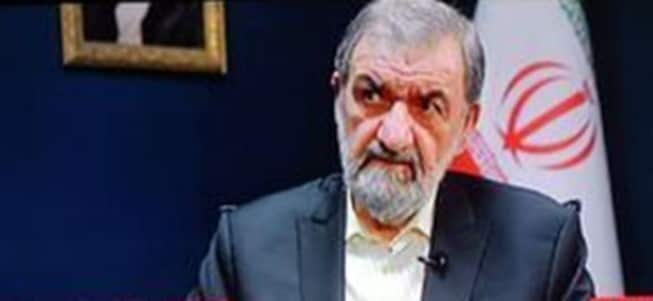
Mohsen Rezai (Source: Javan, August 21, 2024)
Article On The IRGC's Telegram Channel: Vengeance For Haniyeh's Killing Is Delayed Due To Careful Examination Of The Evidence, Risk Assessment, Maintaining The Element Of Surprise, Instilling Fear In The Hearts Of Israelis And Damaging Their Morale
An article posted by the IRGC's Telegram channel on August 17, 2024 clarified that the delay in Iran's response primarily stems from the need to carefully gather intelligence and evidence in order to ensure that the response has international legitimacy and is suited to the situation in the field. In addition, it claimed that Tehran is taking a careful, calculated approach, conducting regional assessments, and taking into consideration the support given to Israel by Arab and Western countries. It further claimed that military action will be taken, which will significantly affect Israel and the balance of power in the Middle East. The article emphasized that the element of surprise is essential to ensuring a deep and significant strike on Israel. The delay in response is intended to cause confusion and fear within the enemy and to damage Israeli morale.
"[...] The primary reason for the delay in Iran's response is that it needs to carefully examine all the details and factors leading to the operation, in order to ensure that the response is based on conclusive and reliable evidence. It must make sure that any action taken is suited to the situation in the field and has international legitimacy. During the first phase, it was important to gather all the necessary information in order to form an appropriate response that will hold up to legal, and not just military, feedback.
"In the second phase, Iran's armed forces must adapt their military plans to the realities of the region, and consider the effects of Arab and Western countries supporting Israel. They are planning the most appropriate military maneuvers with the goal of hurting Israel in a way that will cause a significant shift in the balance of power in the region. Such planning entails risk assessment and preparing back-up plans for a broader response in the case of a regional confrontation.
"Iran also emphasizes the importance of the element of surprise in ensuring significant damage to the enemy. Given the expectation that Iran will immediately respond, delaying the response serves the purpose of creating a military surprise that will deeply affect Israel. The tension and preparations in Israel, driven by fear of an Iranian response, similarly serve Iran's goals by damaging Israeli morale and instilling fear among the settlers [i.e. the Israelis]."[3]
Former Deputy Foreign Minister Of Arab And African Affairs Hossein Jabari Ansari: Iran's Response Will Be Calculated And Will Come After Much Consideration
Three weeks after Haniyeh was killed, in an August 20 interview with Nour News, which is affiliated with Iran’s Supreme National Security Council, Former Deputy Foreign Minister of Arab and African Affairs Hossein Jabari Ansari emphasized that Iran's response to Haniyeh's killing will be "calculated and based in the strategic logic [and experience] we have amassed over the years." He added that "the response will not be swift or rash, but will come following deep consideration and coordination by all the parties involved." He went on to say that the response may be "multi-dimensional, and entail military, security, political, and diplomatic steps, to achieve maximum deterrence."[4]
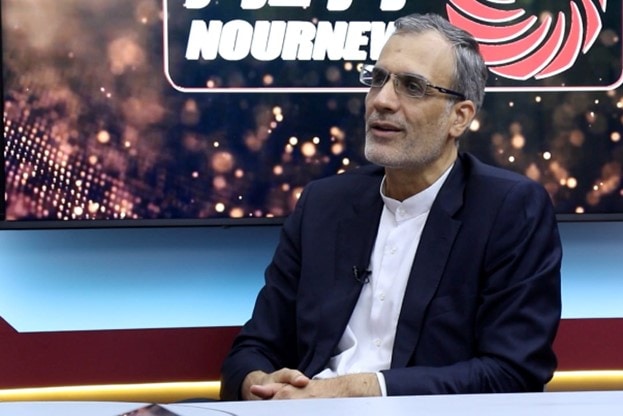
Hossein Jabari Ansari, former Deputy Foreign Minister Of Arab And African Affairs, Nour News (Iran), August 20, 2024.
Regime Mouthpiece Kayhan: The Reason For The Delay In Response Could Be The Broad Scope Of The Planned Attack
On August 15, 2024, the regime mouthpiece Kayhan noted that Iran's response for the assassination of Haniyeh is delayed because Iran is planning a large move, adding that the psychological effect caused by the delay is also significant.
"[...] Every military war is accompanied by psychological and propaganda warfare which aims to change the enemy's perceptions. Iran understands the importance of media influence, and is therefore carefully considering its moves to ensure that its response influences public opinion in the most effective way... Israel has maintained a policy of targeted assassinations for years, and Iran understands that its response must be substantial and calculated enough to halt this policy and send a message of having a strong stance against Israel...
"The larger and more significant the planned response, the more time is needed to consider its every aspect. The delay in response is evidence that Iran is planning a significant move that requires comprehensive preparation... Israel and its allies are waging a psychological war to undermine Iranian determination. Iran understands that its response must be taken seriously, and not under the psychological duress from its enemies... The reason for the delay in response could be the fact that the planned revenge is broad in scope."[5]
IRGC Commander-In-Chief General Hossein Salami: We Will Teach The Enemy To Not Play With The Lion’s Tail; When, Where, And How Is A Riddle That Will Be Reveealed For All With Time, But We Will Definitely Act In A Different Way
On September 8, 2024, speaking at a national congress to honor 2,000 martyrs of Kohgiluyeh and Boyer-Ahmad Province, IRGC Commander-in-Chief General Hossein Salami threatened a different, bitter vengeance against Israel for its deeds. Salami stated that Israel will learn a lesson and that it is toying with forces greater than itself, emphasizing that the enemies will not be able to escape punishment for their actions. He said:
"We will certainly instill the bitter taste of revenge for Israel's evil deeds, so that they learn not to play with the lion's tail [i.e. Iran]... The enemy awaits vengeance to come at any moment, and will feel its bitter taste eventually. When? Where? And how? This riddle will be revealed to all with time, but we will definitely act in a different way. The enemies should not think they can strike and run away. They may strike, but they will not be able to run away, and they will learn the lesson to never again toy with the lion's tail. Israel and the enemies of Islam are in a state of growing defeat... The fight has moved to Israel's own territory, which proved how deep the enemy's internal crisis is. Israel is constantly afraid of Iran's vengeance for its actions, and this fear puts it under unrelenting pressure."[6]
To view the MEMRI TV clip of Salami's statements, click here or below:
IRGC Deputy Commander Of Coordination Mohammed Reza Naqdi: Revenge Against Israel Is Inevitable, Must Come At The Right Time
Speaking at an Isfahan event on September 7, Mohammad Reza Naqdi, the IRGC Deputy Commander Of Coordination, said that revenge for Haniyeh's assassination is "inevitable and will come at the right time to maximize its impact." He said that preparations are underway for an operation that will restore justice for the incident, but he emphasized the importance of timing.
"As has been stated many times, revenge is certain and there is no doubt about that, but it must be carried out at the right time in order to be effective. To friends in Isfahan who asked: ‘What should we do to prepare for this operation?’, I responded: "Prepare some gaz [confection originating in Isfahan] and sweets."[7]
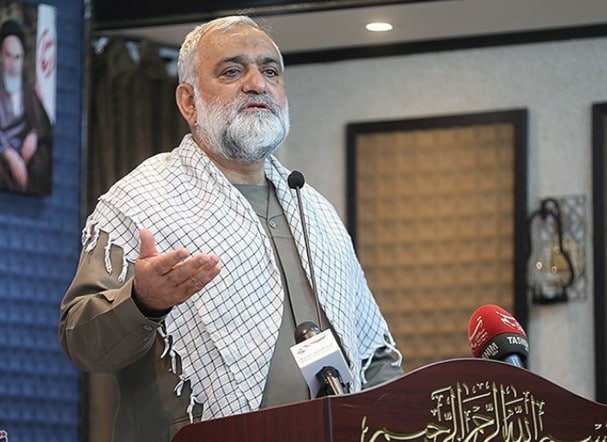
Mohammad Reza Naqdi (Source: Tasnim, September 7, 2024)
Deputy Defense Minister Hojjatollah Qureishi: Our Blow Against Israel Cannot Be Predicted
On August 27, at a Security Industry Day celebration in Tehran, Deputy Defense Minister Hojjatollah Qureishi said that the blow that Iran is going to deliver to Israel cannot be predicted. He emphasized that Israel remains in a state of perpetual panic and stress while Iran decides when and how to strike. He said:
"Right now, the Zionist regime must remain in a state of constant psychological anxiety and fear because the date of the revenge is not known. But what is clear is that our response cannot be predicted, and it will come at a time and in a manner that we decide."[8]
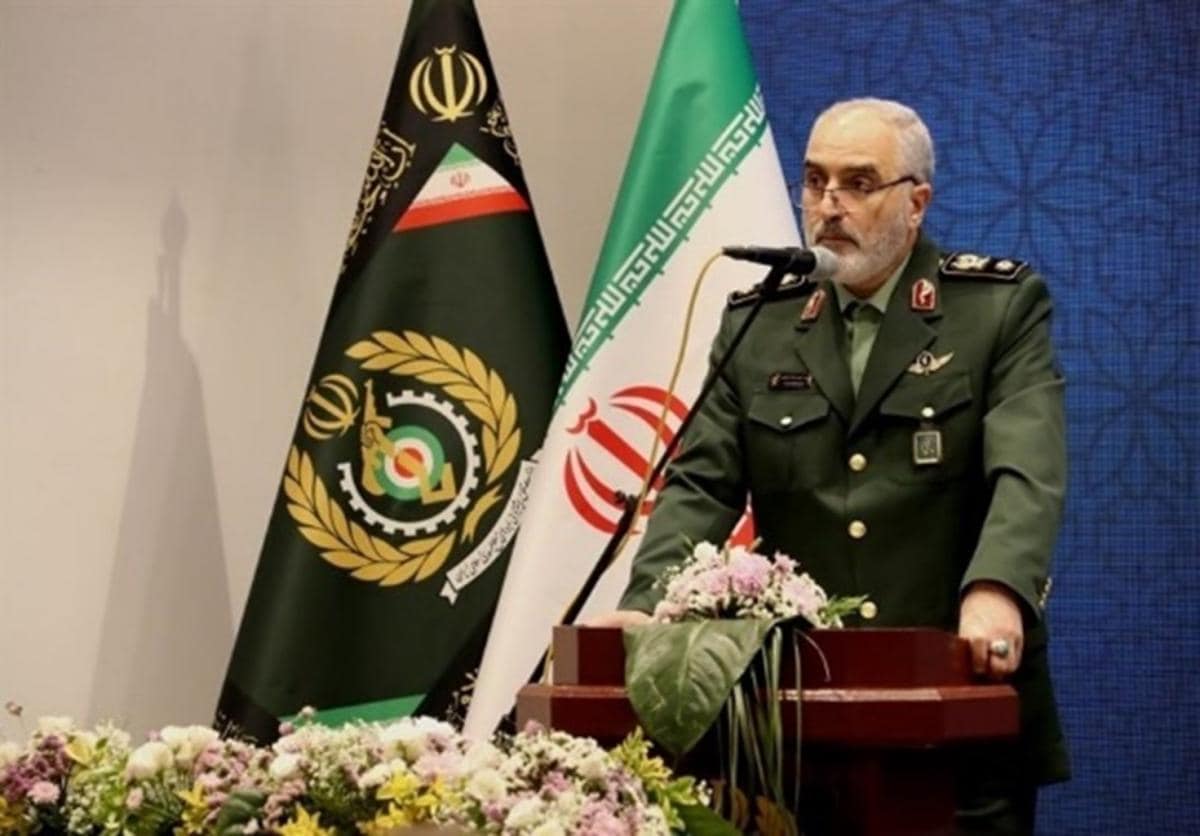
Deputy Defense Minister Qoraishi (Source: Tasnim, August 27, 2024)
Ali Abdollahi, Deputy For Coordination Of The General Staff Of The Iran Armed Forces: We Will Respond Harshly To Israel, But The Timing Is Not Known
On September 4, 2024, at a ceremony commemorating the martyrs of Komala Province, Ali Abdollahi, deputy for coordination of the General Staff of the Iran Armed Forces, said that Iran would respond harshly to Israel's assassination of Haniyeh. When it will do so is not known, he clarified, but went on to emphasize that Israel would not escape a response.
He said: "Iran will respond harshly to the enemy following the assassination of Iran's guest Ismail Haniyeh. The time of the response is not known, but Israel cannot dream that Iran will not respond to this crime. Israel will take that dream to the grave."[9]
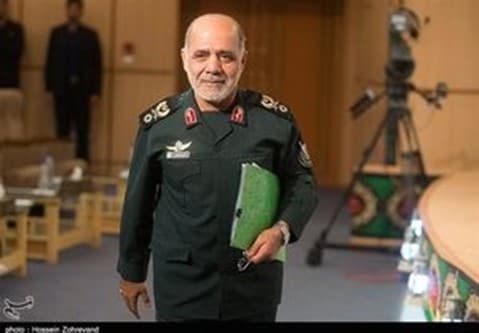
Ali Abdollahi (Source: Mashregh News, September 4, 2024)
Iranian Armed Forces Chief Of Staff Mohammad Bagheri: "\We Will Decide When And How To Avenge; Iran Will Not Fall Into The Enemy's Media Trap
At an August 25, 2024 change of command ceremony Iranian Armed Forces chief of staff Mohammad Bagheri said that revenge for Haniyeh's assassination would come from Iran and the resistance axis. He said that Iran would not fall into the enemy's media trap and that Iran would decide on its own when this would happen. He said:
"Iran's and the resistance axis's revenge for the blood of the martyr Ismail Haniyeh is certain. Iran will not fall into the enemy's media trap, and we are the ones who will decide when and how it will come. The resistance axis will operate independently, as we have seen in their recent operations."[10]
In an August 28 speech at a change of command ceremony for his deputy, Bagheri said that Iran would respond in a calculated manner to Israel's crimes:
"We will certainly respond in a calculated manner to Israel's crimes... Our responsibility today is most sensitive, and there is no room for distraction..."[11]
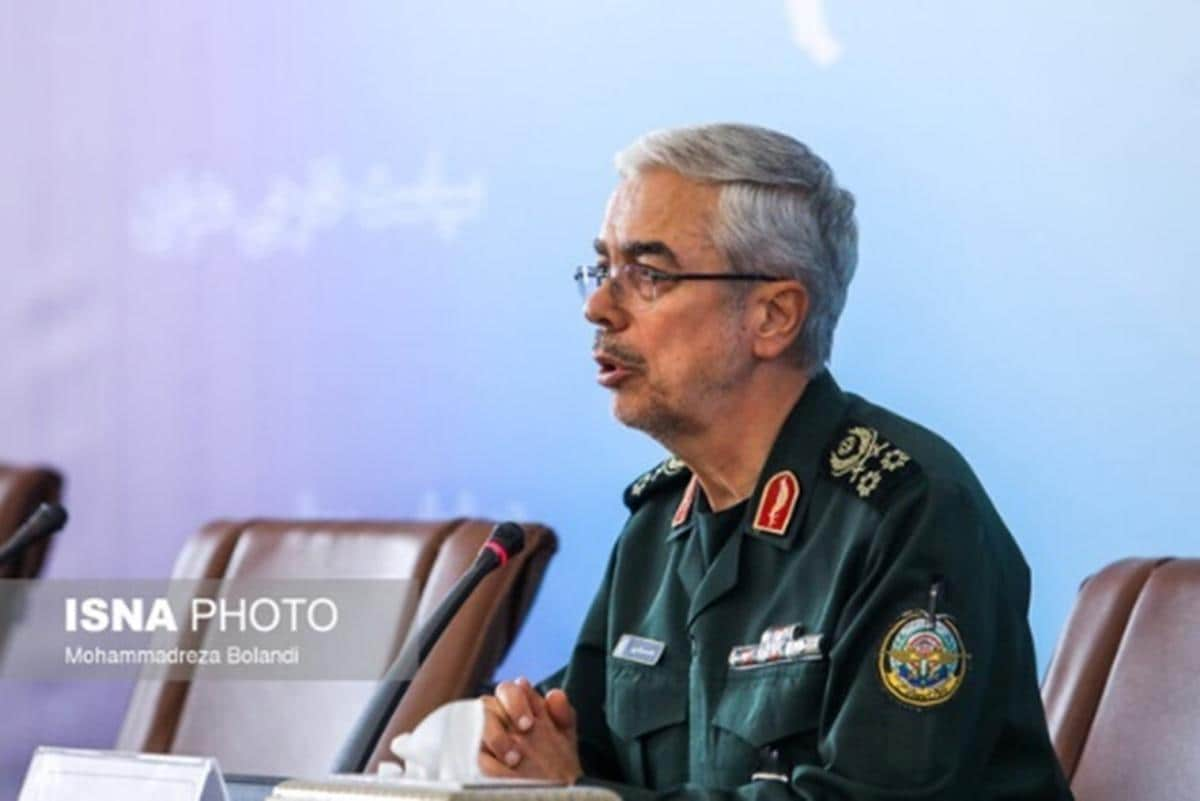
Iranian Armed Forces Chief of Staff Bagheri (Source: ISNA, August 28, 2024)
Explanation 2: Iranian Supreme Leader Ali Khamenei Called For A Tactical Retreat
Supreme Leader Ali Khamenei's statements on August 14 at the National Congress of Martyrs of Kohgiluyeh and Boyer Ahmad Province have been interpreted as an Iranian tactical retreat. Khamenei said: "According to the Quranic interpretation, a non-tactical retreat, in any area, whether in the military field or in the political, propaganda and economic spheres, leads to the wrath of God." That is, vengeance is postponed until a later date, apparently in an attempt to extract compensation in another area.[12] It seems that Khamenei is referring to significant political achievements, perhaps concerning Iran's nuclear program via discussions with the U.S., that will more than make up for the immediate damage caused to Iran by Israel.
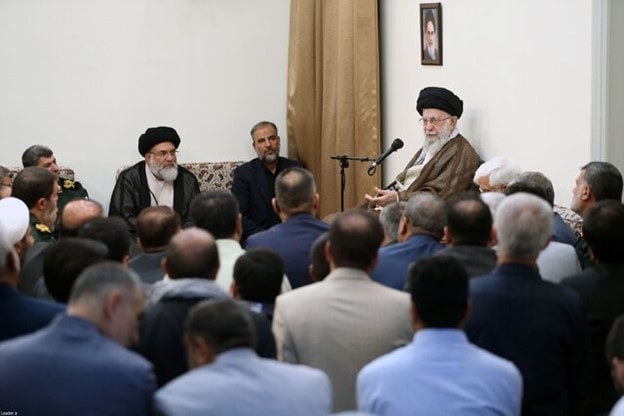
Khamenei (Source: ISNA, August 14, 2024)
Khamenei said: “When the psychological warfare attack of the enemy enters the military battlefield, the outcome is fear and retreat. The Holy Quran says that such retreat sparks God’s wrath. It says: ‘And whoever does so on such an occasion—unless it is a maneuver or to join their own troops—will earn the wrath of Allah [Quran 8:16].’ If when you face an enemy that is attacking you – whether he is using a sword or carrying out a media, economic, or military attack with new tools – you retreat in a fashion that is not tactical (of course, sometimes retreating is a tactic just like advancing, and there is nothing wrong with that), then unless this is part of a strategy, then you will be subject to God’s wrath. This is how it is on the military battlefield, and it’s exactly like that on the political field, it sparks God’s wrath.”[13]
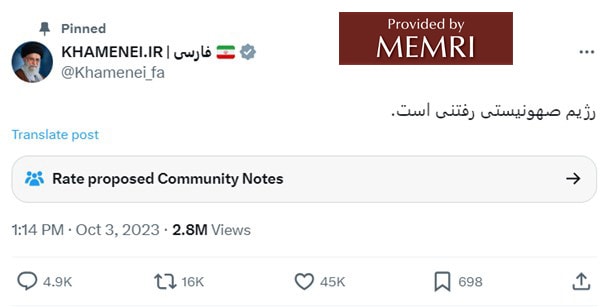
After the assassination of Ismail Haniyeh in Tehran, Khamenei pinned on his X account a post from October 3, 2023 in which he had written: “The Zionist regime is destined to collapse.”
Explanation 3: The Need To Avoid Undermining Gaza Ceasefire Negotiations
Another explanation for the delay was Iran’s desire to avoid undermining the ceasefire negotiations between Israel and the Palestinians, in an attempt to position itself as a leader of the Islamic world and a defender of the Palestinians’ rights. It has been posited that undermining the negotiations efforts due to an Iranian response might damage Iran’s international image, and that the regime is therefore behaving more cautiously in order to balance its desire for vengeance with defending the Palestinians.
Iran’s United Nations Mission: Iran’s Response To Israel May Arrive At A Time And Circumstances That Tel Aviv Least Expects, But In A Fashion That Will Not Negatively Affect The Ceasefire Negotiations
On August 21, 2024, Iran’s Permanent Mission to the United Nations published a statement saying that Tehran’s response to the Haniyeh assassination may take place at a time and circumstances that Tel Aviv least expects, and it underlined that Israel may be surprised by air and by land, even when it thinks it is prepared for the response, but that the timing will avoid a negative impact on the Gaza ceasefire negotiations:
“Iran’s response to Israel may arrive at a time and circumstances that the Zionist regime may consider the least. Perhaps it will come on the ground at a time when their eyes are looking to the skies and to radars, and maybe it will be a combination of both… The response will arrive in a fashion that will avoid having a negative impact on the negotiations for a ceasefire in Gaza.”[14]
Explanation 4: The Delay Is Itself Part Of The Response And Is Conducted As Part Of Strategic Ambiguity That Causes Psychological Distress In Israel
One of the more clever explanations by Iranian media is that the delay in the response is actually part of Iran’s strategy to increase psychological distress and economic pressure in Israel. An article published on August 20 by the official regime outlet, the Islamic Republic News Agency (IRNA), asserted that Iran has taken vengeance against Israel without firing one bullet by means of ‘the strategy of ambiguity,’ and it remained ambiguous regarding the timing of the response, claiming that Israelis are suffering from constant psychological anxiety and distress, living in constant panic in anticipation of the Iranian response. According to the article, this strategy of a deliberate delay has caused an increase in the demand for psychiatric medicine among Israelis, who are struggling to make appointments for the psychiatrist. A similar statement was made by IRGC Deputy Commander General Ali Fadavi, who said on the same day: “For the Zionist regime, the wait for of the revenge is worse than the punishment itself.” In this context, the IRGC-affiliated Tasnim News Agency published on September 8 a cartoon mockingly depicting the anxiety suffered by Israel:
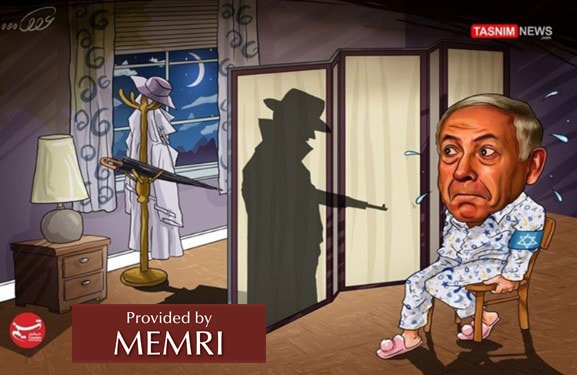
A cartoon published on September 8, 2024 by Tasnim News Agency depicting Israeli Prime Minister Benjamin Netanyahu in his pajamas in the middle of the night shaking and sweating with fear at the sight of silhouette of a person with a gun, which is actually the shadow of a coat, a hat, and an umbrella on a jacket hanger. Source: Tasnim News Agency (Iran), September 8, 2024
IRNA: Iran Struck Israel Without Firing A Single Bullet! Our Strategic Ambiguity Has Put Israel In A State Of Unprecedented Readiness; Israelis Are Finding It Difficult To Make Appointments For Psychiatrists, There Is An Increase In Sleeping Pill Use
On August 20, 2024, the official state outlet Islamic Republic News Agency (IRNA) published an article saying that the delay in Iran’s response is deliberate and is part of the Iranian regime’s “strategy of ambiguity,” which it said has paralyzed Israel’s economy and left Israel helpless because it does not know when Iran will respond. It also said that this ambiguity has had a powerful psychological impact on Israel’s citizens, who are struggling to make an appointment for psychiatrists due to price increase and who are consuming an increased amount of psychiatric medicine. The article reads:
“The strategy of ‘strategic ambiguity’ adopted by Iran over the past two weeks has pushed Israel into a state of unprecedented readiness. All activity in the occupied territories has been disrupted, and the Zionist regime has suffered a heavy economic blow. Most of the international flights to Israel have been cancelled, the Haifa Port has stopped operating, and the Netanyahu government’s meetings are taking place in a basement…
“The equation that began immediately after the assassination of Haniyeh is that Iran, by means of threats alone and without firing a single bullet, has succeeded in paralyzing Israel and dealing a blow to all of it.
“For the first time since its establishment 76 years ago, the Israeli government is confronting a certain Iranian attack, but it cannot do anything but wait. Israel, which carried out a pre-emptive strike against Egypt in 1967, is now helpless before Iran […] which can strike Israel by means of a threat alone and redefine the balance of deterrence between them.
“The strategy of ‘strategic ambiguity’ serves Iran by placing Israel at a state of unprecedented readiness. Economic activity in the occupied territories [i.e. Israel] has been disrupted, and most of the international flights to Israel have been cancelled. The Port of Haifa has stopped operating, and people are hoarding food out of concern that they may need to spend an extended period of time in bomb shelters. The Netanyahu government’s meetings are held in a basement, and the [IDF] Chief of Staff is holding meetings in open fields out of concerns of a missile attack.
“Sky News in Arabic has reported that the most difficult thing in Tel Aviv is to find an appointment for a psychiatrist, and the price for an appointment has increased to $122. In addition, there has been a 30% increase in the use of sleeping pills, and the government is concerned about the possibility that Jews will emigrate from the country. All of this due to the fear of the possible Iranian revenge.”[15]
IRGC Deputy Commander Ali Fadavi: The Wait For Iran’s Response Is Worse For Israel Than The Punishment Itself
On August 20, 2024, IRGC Deputy Commander General Ali Fadavi declared that Israel will bear harsh consequences for the assassination of Haniyeh and that the Iranian response will be harsher than anything it has experienced in the past. He said that Iran will choose the appropriate time and place for its revenge, and that Israel has been living under constant panic in anticipation of the Iranian response, making the wait worse than the punishment itself. He said:
“By killing the martyr Haniyeh, the Zionist regime carried out an unforgivable crime, and this time it will be punished with greater severity. The blood of the martyrs will not remain unavenged, and we will determine the appropriate time and place for our revenge… Israel is living under constant panic in anticipation of Iran’s response. For the Zionist regime, the wait for the revenge is worse than the punishment itself. They live under daily fear of our response, which will come at a time and place of our choosing.”[16]
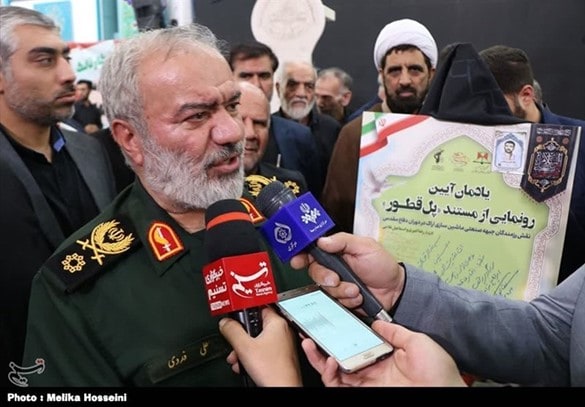
IRGC Deputy Commander Ali Fadavi. Source: Tasnim (Iran), August 20, 2024.
IRGC Spokesman Ali Mohammed Naeini: Time Is Working In Our Favor
IRGC spokesman Brig.-Gen. Ali Mohammed Naeini said at an August 20, 2024 press conference that the time of Iran’s response is not known and that this benefits Iran. He said that Israel has already suffered a defeat with regard to the war in Gaza, and he threatened that Iran’s response will be different from what has taken place in the past. He said:
“It may be that the duration of the wait for Iran’s response to Israel will be long and that the response will not necessarily be a repeat of past operations. The enemy must expect precise and calculated blows at the appropriate time. The Zionist regime has already been defeated, and even the American politicians admit this, since they have not yet succeeded in achieving their goals. Time is working in Iran’s favor and the response may be different from what has been done in the past, since Iran’s commanders are experts in efficiently punishing the enemy, and they do not operate recklessly.”[17]
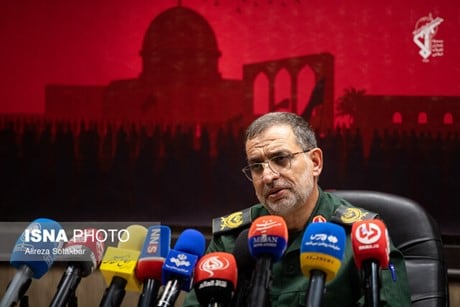
IRGC spokesman Brig.-Gen. Ali Mohammed Naeini. Source: ISNA (Iran), August 20, 2024
Explanation 5: Not All Of Iran’s Responses Against Israel Are Known To The Public
Another explanation was voiced by the IRGC Qods Force’s deputy commander for operations Mohsen Chizari, who said on August 31, 2024 that Israel is being struck with “responses from every direction,” but only part of them are known to the public and many of them are secretive.
In this context, it is noteworthy that on August 28 the IRGC had published on its Telegram channel a false claim that several Israeli officials – including the commander of Israel’s Military Intelligence Directorate Unit 8200, his deputy, and “the brains behind the AI in the Iron Dome [air defense system]” – were assassinated by Hizbullah, Iran’s proxy in Lebanon. The latter individual’s name that was published by the channel was the name of an Israeli soldier who had been killed in action in the Gaza Strip a few days earlier. The post was removed from the channel several days later, and on September 5 the channel shared another post claiming that a scientist from the Israeli state-owned aerospace and defense company Israel Aerospace Industries (IAI) had been assassinated near the entrance to the research facility at which he worked. According to the channel’s claims, the scientist in question had played a central role in the interception of drones during “Operation True Promise,” the April 14, 2024 Iranian drone and ballistic missile attack against Israel.[18]
IRGC Qods Force Deputy Operations Chief Mohsen Chizari: Only Some Of The Responses To Israel Are Known To The Public
On August 31, 2024, the IRGC Qods Force’s deputy commander for operations Mohsen Chizari said: “The criminal Zionists are being struck with responses from every direction, but only some of them are known to the public.”[19]
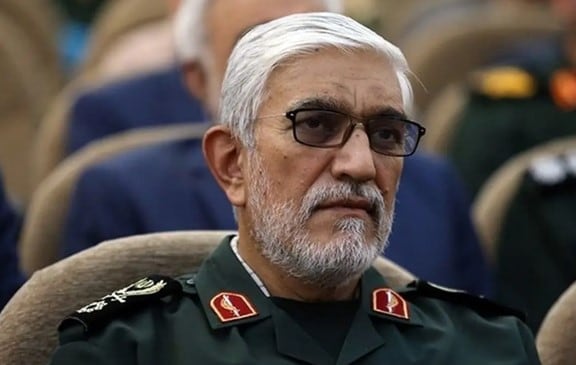
IRGC Qods Force Deputy Operations Chief Mohsen Chizari. Source: ILNA News Agency (Iran), August 31, 2024
Explanation 6: Iran Is Avoiding A Response So That Israel Doesn’t Have A Way Out Of Its Crisis In Gaza Or An Excuse To Attack Iran
On September 9, 2024, Iranian political analyst Emad Abshenas said on a show on Sky News Arabia (UAE) that the final goal of Iran and the resistance axis is to destroy Israel, and that a direct Iranian attack against Israel might actually help Israeli Prime Minister Benjamin Netanyahu extract himself from the political crises he faces, which Iran is not interested in doing. Abshenas suggested that by avoiding an attack against Israel, Iran is denying Israel a way out of its crisis in Gaza by attacking Iran.
Iranian Political Analyst Emad Abshenas: The Final Goal Is To Destroy Israel; Attacking Israel Might Actually Help It
Iranian political analyst Emad Abshenas explained in a September 9, 2024 show on Sky News Arabia (UAE) that the "final goal of Iran and the resistance axis is to destroy Israel." He explained that any Iranian attack against Israel might save Netanyahu from his own entanglements, and it is not in Iran's interest to do so because Netanyahu is destroying "everything the Jews have been trying to build for 2,000 years.”
[1] Farsi.khamenei.ir, July 31, 2024.
[2] Javanonline.ir/fa/news, August 21, 2024.
[3] T.me/sepah_pasdaran/148480, August 17, 2024.
[4] Nour News (Iran), August 20, 2024.
[5] Keyhan (Iran), August 15, 2024.
[6] Mashregh News (Iran), September 8, 2024.
[7] Tasnim News Agency (Iran), September 7, 2024.
[8] Tasnim News Agency (Iran), August 27, 2024.
[9] Mashregh News, September 4, 2024.
[10] Aser-i Iran (Iran), August 25, 2024.
[11] ISNA (Iran), August 28, 2024.
[12] See MEMRI Inquiry & Analysis Series No. 1782, Deterred By Israel, Tehran Returns To Its Strategy Of Using Proxies And Extracting Gains From The U.S.; Iranian Regime Mouthpieces: Instead Of Reprisal Against Israel By Missile Strategy, We Must 'Create Insecurity In Tel Aviv And Other Central Places In Israel'; 'Sabotaging Sensitive Centers In Israel, Carrying Out Terror Attacks, And Even Assassinating Top Leaders Could Be A More Painful Response Than A Massive Missile Strike', August 12, 2024.
[13] Farsi.khamenei.ir, August 14, 2024.
[14] Aser-i Iran (Iran), August 21, 2024.
[15] IRNA (Iran), August 20, 2024.
[16] Tasnim News Agency (Iran), August 20, 2024.
[17] ISNA (Iran), August 20, 2024.
[18] T.me/sepah_pasdaran, September 5, 2024.
[19] ILNA News Agency (Iran), August 31, 2024.




